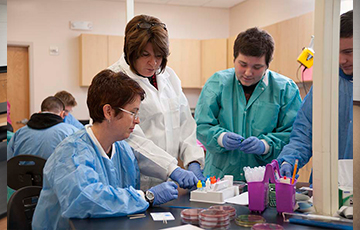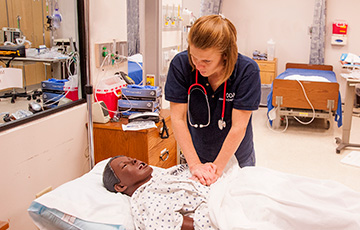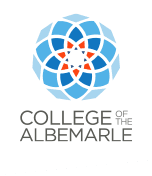The Future of Allied Health & Nursing Careers

The Coming Boom of Healthcare Jobs
With an aging population of baby boomers and an increasing number of nurses and other medical professions reaching the age of retirement, nursing careers job opportunities within the healthcare industry are growing exponentially.
Now is a great time to start allied health and nursing careers.
Career Focus
Allied Health Programs for In-Demand Jobs
Many people are drawn to a career that allows them to help others regain their health, or maintain and improve their health. Yet for some, the intense, hands-on care of nursing isn’t of interest. Fortunately, College of The Albemarle (COA) offers a host of allied health programs that allow these individuals to become an important part of today’s healthcare team.
Health and Fitness Science
Americans are increasingly concerned with getting and remaining in shape. You can help them achieve their goals through COA’s Health and Fitness Science program. Students train in exercise science and learn to administer health risk appraisals, teach fitness classes, instruct in the proper use of exercise equipment and design customized exercise programs. Graduates are qualified for careers in the fitness and exercise industry. Hosted mainly on COA’s Elizabeth City Campus and the adjacent Albemarle Area YMCA, the program also includes online and work-based learning components. Degree options include a two-year Associate in Applied Science (AAS) degree and a one-year certificate.
Human Services Technology
The Human Services Technology program at COA helps prepare students for a variety of positions in the fields of mental health, childcare, family and social services, and rehabilitation. Emphasis is placed on experiential learning with a wide range of classes from Medical Terminology, Community Health, Social Problems, Counseling and Human Services Issues. There are a number of programs at four-year colleges and universities that the completed courses will transfer to. Offered as an AAS or diploma, instruction takes place in a combination of classroom, online, lab and work-based training.
Medical Laboratory Technology
In COA’s Medical Laboratory Technology program, students gain the knowledge and clinical experience needed to perform routine laboratory procedures that are typically used in the diagnosis and treatment of diseases, including chemistry, hematology, microbiology and immunohematology.
 Laboratory Technicians are employed by hospitals, reference and forensic laboratories, pharmaceutical and biotech firms, and even veterinary offices. Upon completing the AAS program, students are eligible to take a national certification exam to become a certified Medical Laboratory Technician. There are also opportunities for further education such as Clinical Laboratory Science programs offered at four-year colleges and universities.
Laboratory Technicians are employed by hospitals, reference and forensic laboratories, pharmaceutical and biotech firms, and even veterinary offices. Upon completing the AAS program, students are eligible to take a national certification exam to become a certified Medical Laboratory Technician. There are also opportunities for further education such as Clinical Laboratory Science programs offered at four-year colleges and universities.
Surgical Technology
The Surgical Technology program at COA trains students to assist in the care of surgical patients in the operating room and to function as a member of the surgical team.
Surgical Technologists prepare supplies, equipment and instruments, prepare patients for surgery and serve as an important role in anticipating a surgeon’s needs during operation. Besides the operating room, Surgical Technologists are essential staff members of physicians’ offices, labor, delivery and emergency departments, and dialysis units.
The associate degree program takes 18 months to complete and graduates are eligible to take the national certification exam for Surgical Technologists.
Healthcare Business Informatics
The Healthcare Business Informatics program prepares students for employment as a specialist in installation, data management, data archiving/retrieval and computer training for medical information systems. This IT-based program can be completed as a two-year associate degree or a one-year certificate.
Employment opportunities vary from database/data warehouse analysts, technical support professionals, to networking and security technicians. Students apply current and emerging technology applications and data standards to construct medical records and clinical databases and utilize technology to ensure data collection, storage, analysis and reporting of healthcare information.
Read important information about educational debt, earnings and completion rates of students who attended these programs.
Nursing Careers at the Forefront of Change
The $2.8 trillion healthcare industry in the U.S. is so large that it’s practically an economy in itself. It’s poised to grow — and change — dramatically over the next decade.
 In fact, seven of the 10 fastest growing careers are in healthcare, with Registered Nurses (RNs) and Nurse Aides in especially high demand. The Labor Department projects the addition of about 440,000 new job openings for RNs through 2024, and nearly 700,000 retirements in the field. Licensed Practical Nurses (LPNs) are also projected to grow faster than average through 2026. This makes a nursing degree a sure bet.
In fact, seven of the 10 fastest growing careers are in healthcare, with Registered Nurses (RNs) and Nurse Aides in especially high demand. The Labor Department projects the addition of about 440,000 new job openings for RNs through 2024, and nearly 700,000 retirements in the field. Licensed Practical Nurses (LPNs) are also projected to grow faster than average through 2026. This makes a nursing degree a sure bet.
Sound Investment
It’s a bet that pays off. Nursing is among the best paid healthcare professions, with a relatively smaller education and training investment. In 2015, RN median pay stood at $67,490 per year, or $32.45 per hour.
RNs are licensed by the state, but typically also hold either an associate or bachelors in nursing. Many begin with a two-year degree and work their way up the education and pay ladders while working in the field.
Changes Ahead
The demand for new healthcare professionals is due to some obvious — and some maybe not-so-obvious — reasons.
First, and most obvious: A generational changing of the guard is underway. The baby boomer population is aging and they need more healthcare services.
There are more Americans over the age of 65 than at any other time in U.S. history, and by 2030, about one in five Americans, 69 million people, will be elderly. About 80 percent of this population has at least one chronic condition, according to the National Council on Aging.
An increasing amount of nurses are coming into retirement age themselves, creating enormous demand for replacements. About a third of the workforce, around one million RNs, is currently older than 50.
The American Nursing Association projects a whopping 1.2 million openings will emerge for RNs through 2022, and by 2025, Vanderbilt University researchers estimate the vacancies will be “more than twice as large as any nurse shortage experienced since the introduction of Medicare and Medicaid in the mid-1960s.”
Another major factor: People are living longer and have more active lives, so the kinds of healthcare services in demand are changing. Physical therapists and nurses will play a big role in the next decade.
Preventive care is putting nurses on the front line as people become more educated about living healthier lives. Obesity and diabetes are expected to be as much a focus of preventive care as they are of treatment.
“As the healthcare industry rapidly advances in technology and services, the nursing faculty at COA continually evolves with the changes to offer the very best instruction for our students. Our faculty members ensure that students develop the skills necessary to be prepared to enter the workforce,” said Robin Harris, Dean, Health Sciences and Wellness programs. “Through rigorous courses, labs, simulations and clinical hours in a wide variety of facilities across all seven counties of our service area and southeastern Virginia, our students graduate with the competencies and knowledge of their important role as patient care providers and advocates for health.”
COA RN to BSN Step Center
The Strategic Transition in Education Progression (STEP) Center is focused on recent Associate Degree Nursing (ADN) graduates as well as RNs within the community. The STEP Center will aid your academic progression by promoting your completion of Registered Nursing-Bachelor of Science in Nursing (RN to BSN) or RN to Master of Science in Nursing (RN to MSN) prerequisite courses and streamline the transition into RN-BSN/MSN programs based on your individual needs and academic history. The center can help you identify which RN-BSN program best fits your needs and guide you through the prerequisite identification and completion process at COA.
COA also partners with East Carolina University RIBN and Old Dominion University to offer our ADN students the option to simultaneously take classes toward a BSN while enrolled in COA’s ADN program.
To learn more, contact Kathy Lawrence at 252-335-0821 ext. 2325.


